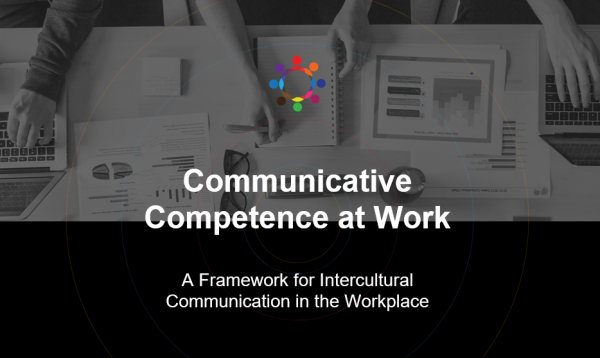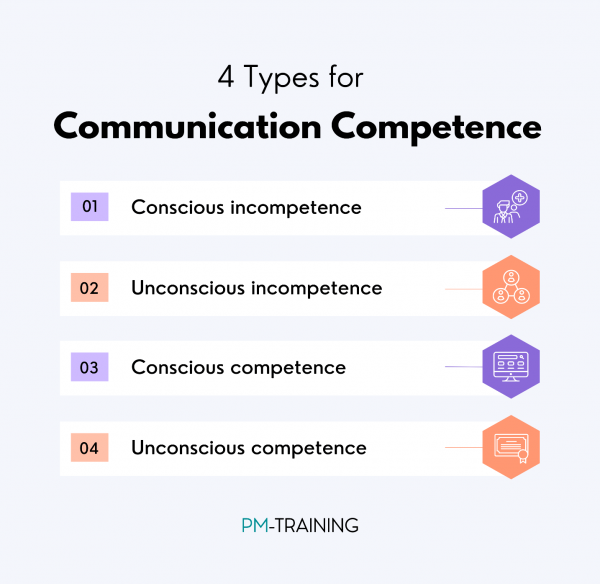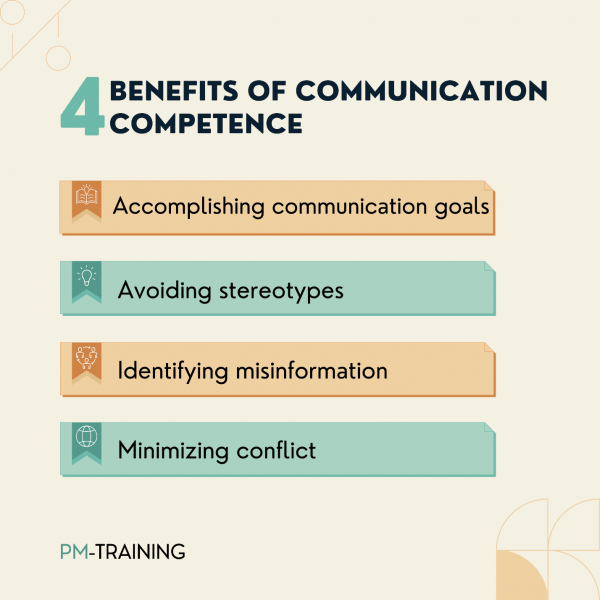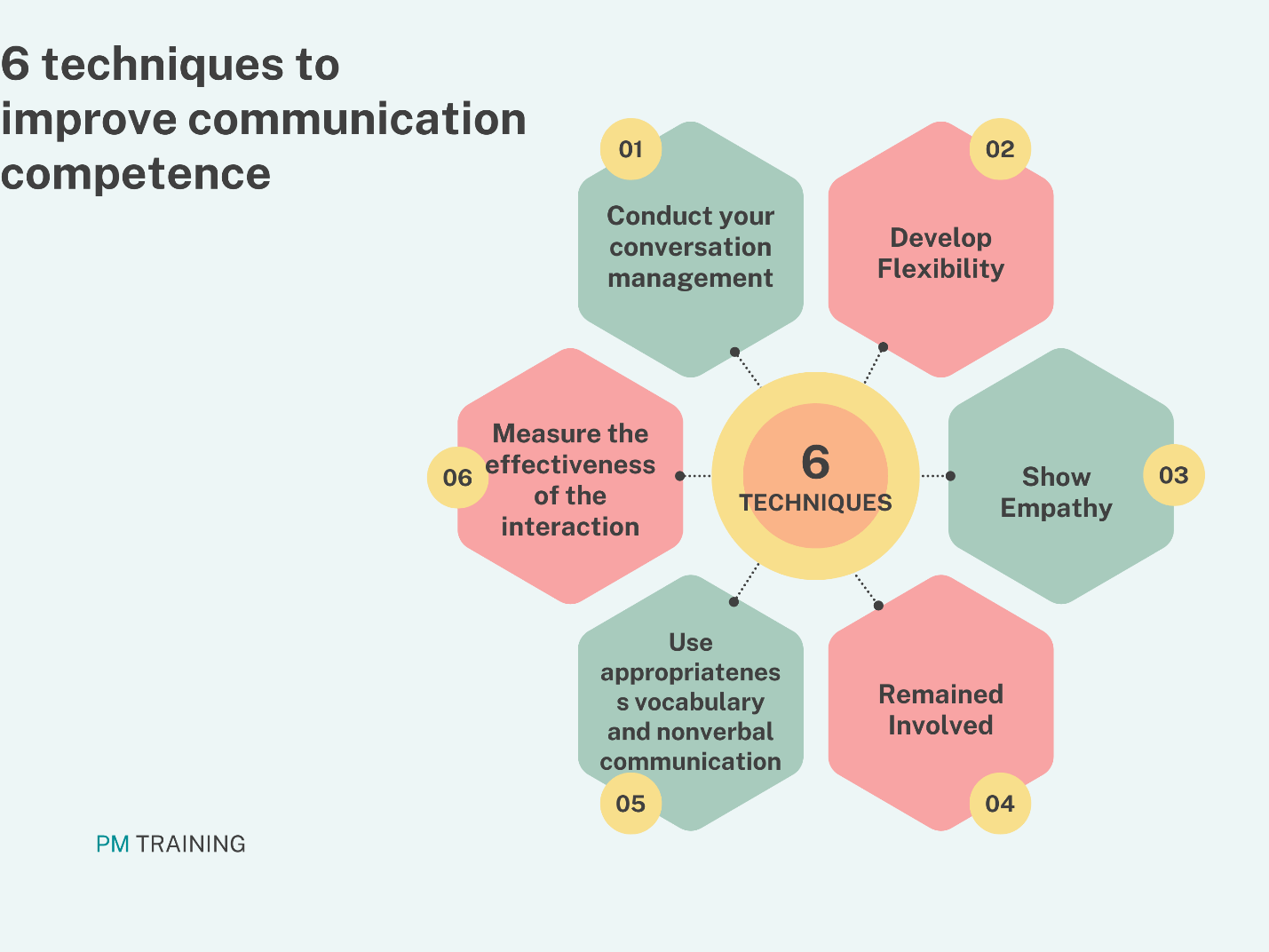The ability to effectively convey one’s thoughts and ideas to others is referred to as communication competency. To accomplish your objectives in a discussion, such as influencing an audience, you could find it helpful to improve communication skills. Your ability to talk with people successfully may be improved by having a better understanding of communication competency.
This article defines communication competence for project managers, explains its advantages for team management, offers suggestions for increasing it, and offers advice on how a project manager can improve communication competence
What Is Communication Competence?
The understanding of grammar, syntax, and nonverbal signals, as well as when to use them in diverse social circumstances, is known as communication competency. Learning and seeing how others around you communicate can help you become competent. You may then use what you’ve learned and seen in your social interactions. Despite the fact that project managers may learn to communicate more effectively, their personality traits and genetic makeup can also affect how they interact with others.
For instance, a project manager who is uncomfortable speaking in front of others may be able to communicate well while alone, but he could forget when he is in front of a group of people, which makes him uncomfortable. He can use what he learns as he will become more proficient in communication to the encounters daily life communication challenges.

Types Of Communication Competence
There are four types of communication competence, which are as follows.
Conscious incompetence: When you have mastered the principles but have not yet used them in your social interactions, you are said to be speaking incompetently. This is known as conscious incompetence.
Unconscious incompetence: When you lack the skills to enhance your communication and are unaware that you are doing so, you are exhibiting unconscious incompetence.
Conscious competence: When you recognize that you are now speaking effectively, you have conscious competence. You may take what you’ve learned from this event and utilize it as a foundation for future social interactions.
Unconscious competence: When you have unconscious competence, you can communicate effectively without giving it much or any thought. In your social interactions, it becomes a second nature skill.
Moreover, as you gain communication skills, you may modify your communication strategies to fit the social context of each situation. For instance, how you interact with someone in a more informal situation, such as a dinner party, might vary from how you interact with them in a more formal context, such as at a networking event.

Importance Of Communication Competence
There are several upsides associated with enhancing and using one’s communication skills, such as:
Accomplishing communication goals:
One advantage of being competent in communication for project managers is being able to achieve their communication objectives. When interacting with others, project managers often make an unconscious or conscious connection between their communication aims and their emotions and feelings. You can convey your intentions both orally and nonverbally, which means that even if you aren’t speaking, someone else may be able to infer how you feel about the topic based on your body language and other nonverbal indicators.
There are three main categories of communication goals which include:
Self-presentation goals: A self-presentation communication aim is being clear about who you are and how you want to be seen by others around you.
Instrumental goals: Your capacity to resolve interpersonal disputes, convince people while you’re conversing with them and influence others are all examples of instrumental goals.

Relational goals: Your relational goals are how you create and maintain bonds with your friends, loved ones, coworkers, and acquaintances. It also emphasizes how you resolve conflicts with important individuals in your life.
For instance, understanding these three communication goals will enable project managers to leverage their expertise to attain project goals. In a situation where project managers must present themselves as knowledgeable and authoritative to influence an audience, it could be simpler for them to pinpoint the main project goals.
Avoiding stereotypes:
The ability to avoid using inappropriate words and stereotypes in your vocabulary is another advantage of improving your communication competency. When communicating verbally or in writing, you may avoid using these words and phrases. Ensuring that when you communicate with people, you use inclusive and acceptable language. Others who are close to you could feel secure as a result. It demonstrates your capacity for effective communication as well as your broad vocabulary and academic background.
Identifying misinformation:
When you’re among others, it’s easier to spot false information. In order to better understand the discussion, you’re having, you may employ context cues while you’re communicating effectively. The speaker’s nonverbal signals might help you determine this. For instance, a change in body language can signal inaccurate information, but it might also suggest that the speaker is feeling uneasy.
If you’re not sure about what they’re saying, you might ask them to elaborate, perhaps by providing an example or revealing their sources. If you have questions about the accuracy of the facts they were discussing, and you want to keep peace with them, you may research into it later to avoid any conflict with them.
Minimizing conflict:
When you are competent in communication, you can defuse tense circumstances, which will help you understand how to decrease conflict in your interpersonal relationships. A wide range of conflicts usually occurs between a project manager and a project team. Therefore, to avoid additional confrontation, you might shift the topic of the discussion. You may also attempt to defuse the tension in the dialogue by recognizing the opposing point of view. Try to come up with ideas for what you two can do to feel secure in the conclusion if the disagreement calls for a compromise from both sides.
You may both agree to disagree when you’re in a heated argument with someone and it doesn’t need making a choice. Before the disagreement worsens, you may then shift the topic of the discussion.
How To Improve Communication Competence?

Here are six techniques that project managers may use to enhance their communication competence:
Conduct your conversation management:
Your ability to continue a conversation, including how you handle subject shifts and how you adjust to the surroundings, is known as conversation management. Consider how you would respond if you were conversing with someone and suddenly the noise level in the room increased. Your ability to communicate may increase as you are exposed to more social situations and learn how to manage them.
Develop flexibility
As you become more flexible in your social relationships, your communication skills will increase. According to the context of your surroundings, there are six criteria you may utilize to guide your communication:
Composure: Be conscious of your feelings and responses while engaging in social interactions. In most circumstances, it’s advantageous to maintain composure and accuracy while speaking since it may improve how people around you interpret your message.
Confirmation: In a social setting, if you’re paying attention to others, you may recognize their communication objectives when they speak. For instance, you may nod from time to time to show that you’re paying attention, ask them for clarification, or provide your own opinion after they’ve done speaking.
Experience: If you’ve participated in a variety of social activities, you may utilize your previous interactions as a model for your present ones. For instance, consider a moment when a social contact you were a part of went well, and utilize it to help you develop your communication competency.
Articulation: Working on your ability to express your thoughts and views clearly while speaking with others might help you become more socially competent. Your vocabulary, sentence structure, and nonverbal clues when speaking may all aid in improving your articulation.
Disclosure: It’s beneficial to maintain awareness of the information you’re sharing, as well as how much you’re revealing, while engaging in social interactions, whether it’s a chat with another person or a presentation to an audience. If you’re giving a presentation or discussion about a subject that has a lot of material, you might start with the fundamentals of the issue to give the audience a broad overview.
Wit: If a discussion becomes tense, you may utilize your wit or tasteful humor to help defuse it. You may defuse tension and improve your interpersonal connections by changing your sense of humor to fit the social situation.
Show empathy
The capacity to comprehend other people’s feelings is known as empathy. You may convey empathy to another individual during a discussion by listening to what they say or observing their nonverbal cues. As opposed to attempting to assist them in overcoming their difficulties, it is more important to comprehend their feelings. By demonstrating empathy, you may improve your connection with the other person and foster trust between you two.
Remained Involved
You may pay attention to how you engage in social interactions as you work to enhance your communication competency. Understanding what to keep doing while socializing may be aided by recognizing your conversational talents, such as keeping eye contact with the other person. Finding your areas of weakness can help you focus your efforts on strengthening them. Here are three things project managers must observe while conversing with others:
Perception: Think about how the person you’re speaking to perceives you and decide whether that is the perception you really want to give.
Response: Understand what to say and how to communicate with the other person in a conversation.
Attention: Recognize the focus of your attention when you engage in conversation. Actively hear and comprehend what the other person is saying.
Use appropriate vocabulary and nonverbal communication
While having the discussion and afterward, you may gauge how suitable your communication was. The nonverbal clues, facial expressions, and words that the other person is using to communicate with you may all be used to make this determination. The context of the conversation will also influence the appropriateness of your speech and nonverbal cues. For instance, if you’re attending a professional conference, you may speak in a manner that is more acceptable for the setting than you could at an office Christmas party.
Measure the effectiveness of the interaction
You may reflect on a conversation’s effectiveness after you’ve had it. You may check in with yourself to see whether you and the other person reached the conversation’s goals or if you met your own personal objectives. If you often engage in productive talks, your communication competence abilities may be strengthened.
Tips and Best Practices
Here are some tips and suggestions project managers may follow to develop their communication abilities:
Educate yourself: If you want to become a more effective project manager, it could help you to study communication subjects on your own or enroll in communication classes. Taking a course may help you recognize the fundamentals of communication and provide you the chance to put what you’ve learned and apply it.
Communicate your ideas clearly: Learn to express your thoughts in writing or speaking with clarity. This might make it easier for you to communicate your thoughts to others in a way that they will comprehend.
Listen actively and attentively: You may utilize active and focused listening to improve your communication skills. By doing this, you may demonstrate to the other person that you appreciate what they have to say and that you are interested in what they have to say in terms of communication.
Request feedback: You may ask your friends, family, and project team to provide you with feedback on your interactions with them if you’re honest about needing to improve your communication competence. You may improve by doing by identifying your strengths and limitations.
